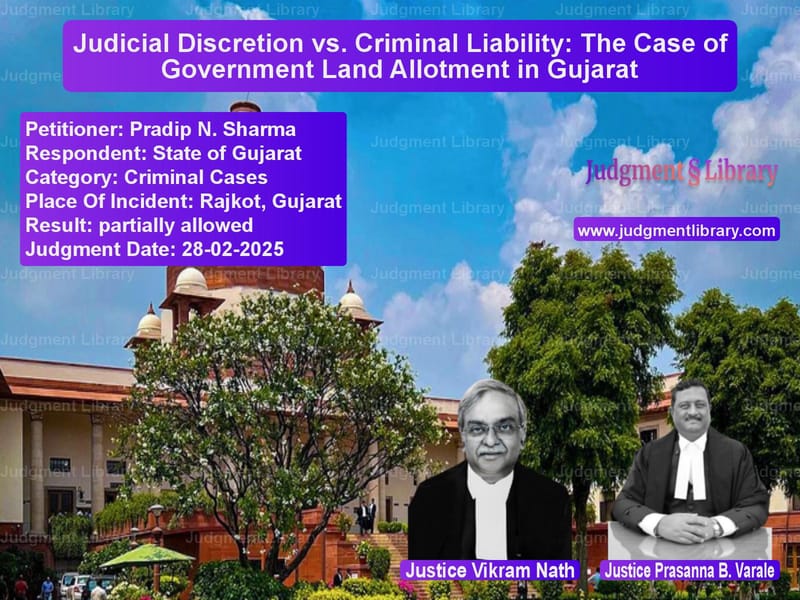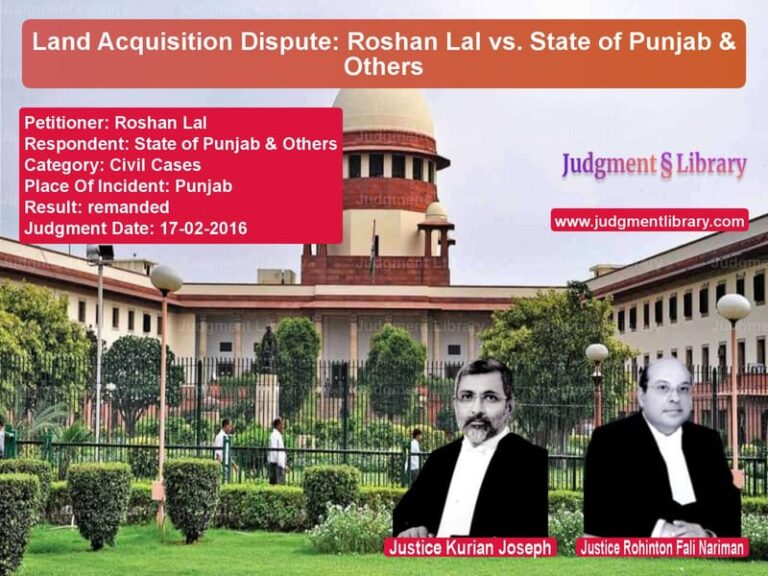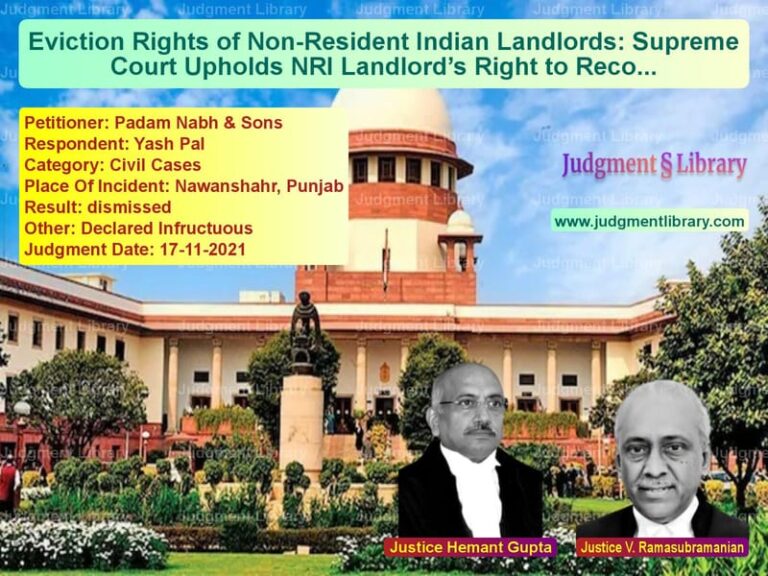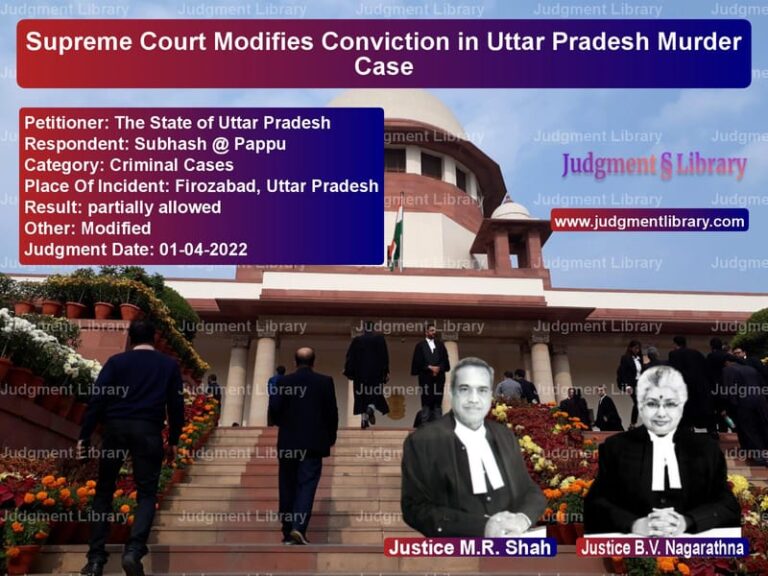Judicial Discretion vs. Criminal Liability: The Case of Government Land Allotment in Gujarat
The case of Pradip N. Sharma vs. State of Gujarat is a significant legal battle involving allegations of misuse of official powers by a high-ranking government officer. The case revolves around the appellant, a former District Collector, who allegedly acted in favor of private individuals in the allotment of government land. The Supreme Court’s judgment in this matter extensively discusses the legal principles governing administrative discretion, criminal liability, and the necessity for judicial intervention in executive decisions.
Background of the Case
The appellant, Pradip N. Sharma, served as the District Collector of Rajkot, Gujarat. The dispute arose from an order he passed in 2008, reinstating land to private allottees, despite the government previously reclaiming it due to non-compliance with the terms of allotment. The prosecution alleged that this act was unlawful and amounted to criminal breach of trust under Sections 409, 219, and 114 of the Indian Penal Code (IPC).
Details of the Allegations
The key allegations against the appellant include:
- Reversing a previous government decision that had forfeited the land due to the allottees’ failure to cultivate it.
- Condoning a delay of seven years in filing an appeal without reasonable justification.
- Failing to verify the authenticity of the power of attorney used to claim the land.
- Proceeding with the order despite having been transferred from Rajkot to Bhavnagar at the time.
Petitioner’s Arguments
The appellant, through his counsel, argued that the allegations were politically motivated and lacked any substantive legal basis. His key arguments were:
- The FIR was registered four years after the order was passed, which indicated a mala fide intention.
- The land allotment dispute was a civil matter and did not constitute a criminal offense.
- As the District Collector, he had the quasi-judicial authority to adjudicate such disputes and his decision was within the legal framework.
- The prosecution was selectively targeting him, as multiple FIRs had been registered against him over the years.
- He was not entrusted with the property in a manner that would attract charges under Section 409 IPC.
Respondent’s Arguments
The State of Gujarat, through its legal counsel, contested the appellant’s claims and asserted that his actions constituted criminal misconduct. Their primary arguments included:
- The appellant passed the order despite knowing that the allottees had not cultivated the land for decades.
- The power of attorney used to claim the land was questionable, and the appellant failed to conduct due diligence.
- The appellant had already been transferred out of the district when he issued the order, raising questions about his jurisdiction.
- Multiple similar allegations had been made against the appellant, indicating a pattern of misconduct.
Observations by the Supreme Court
The Supreme Court analyzed the case by considering the factual matrix, the legal provisions, and the necessity for judicial intervention in administrative decisions. The bench observed:
“While the appellant may have exercised his discretion as a quasi-judicial authority, it is the manner in which the discretion was exercised that raises serious concerns. The delay in filing the appeal, the questionable authenticity of documents, and the timing of the order—all suggest a deliberate attempt to favor private parties.”
The Court further noted:
“An erroneous decision by an administrative officer does not automatically translate into criminal misconduct. However, when such a decision appears to be driven by extraneous considerations, it warrants scrutiny. The appellant’s act of passing an order despite his transfer is highly irregular.”
Decision on Quashing of FIR
The appellant had sought to quash the FIR under Section 482 of the Code of Criminal Procedure (CrPC), arguing that it was frivolous and motivated. However, the Supreme Court refused to grant this relief. The Court held:
“At this stage, quashing the FIR would amount to preempting an investigation that could reveal deeper irregularities. The allegations are serious and involve potential misuse of public resources. Therefore, it is imperative that a thorough inquiry be conducted.”
Decision on Anticipatory Bail
The appellant also sought anticipatory bail, contending that custodial interrogation was unnecessary as the case primarily involved documentary evidence. The Supreme Court, while granting bail, imposed certain conditions:
- The appellant must cooperate with the investigation as and when required.
- He must furnish a personal bond of Rs. 1,00,000.
- If the investigating agency requires custodial interrogation, they must seek permission from the Magistrate.
The Court reasoned:
“Considering the nature of allegations and the fact that the matter is largely based on documentary evidence, custodial interrogation does not appear necessary at this stage. The appellant’s presence can be ensured through conditional bail.”
Conclusion
The Supreme Court’s decision in this case reflects the nuanced balance between administrative discretion and criminal liability. While officials are granted broad powers to adjudicate disputes, such powers must be exercised within legal boundaries. This case underscores the importance of due diligence, procedural fairness, and accountability in governance.
Petitioner Name: Pradip N. Sharma.Respondent Name: State of Gujarat.Judgment By: Justice Vikram Nath, Justice Prasanna B. Varale.Place Of Incident: Rajkot, Gujarat.Judgment Date: 28-02-2025.
Don’t miss out on the full details! Download the complete judgment in PDF format below and gain valuable insights instantly!
Download Judgment: pradip-n.-sharma-vs-state-of-gujarat-supreme-court-of-india-judgment-dated-28-02-2025.pdf
Directly Download Judgment: Directly download this Judgment
See all petitions in Fraud and Forgery
See all petitions in Bail and Anticipatory Bail
See all petitions in Judgment by Vikram Nath
See all petitions in Judgment by Prasanna Bhalachandra Varale
See all petitions in partially allowed
See all petitions in supreme court of India judgments February 2025
See all petitions in 2025 judgments
See all posts in Criminal Cases Category
See all allowed petitions in Criminal Cases Category
See all Dismissed petitions in Criminal Cases Category
See all partially allowed petitions in Criminal Cases Category







